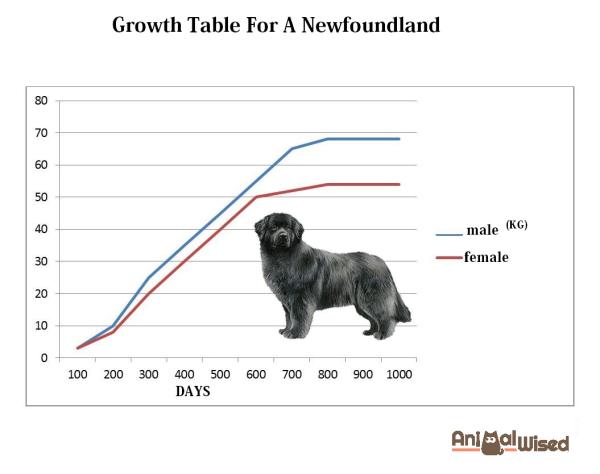What Is The Best Food For a Newfoundland Dog?



See files for Dogs
The Newfoundland is a giant, massive and imposing dog that exhibits a privileged muscular mass and an exuberant beauty. Of course, it is important to understand that all dogs, regardless of their age, race or sex, need a complete and balanced diet to maintain good health and to allow their physical, cognitive, social and emotional skills to develop fully.
If you are the proud guardian of a Newfoundland dog or are thinking of adopting this beautiful furry breed, it must be clear that its nutrition is a determining factor for its physical and mental health. If you are wondering how to offer your best friend the best diet, we invite you to continue reading this article by AnimalWise on what is the best food for a Newfoundland dog.
- Newfoundland dog: character and characteristics
- Newfoundland weight chart
- Feeding a Newfoundland puppy
- How much and how many times a day does a Newfoundland dog eat?
- Feeding an adult Newfoundland dog
- How much does an adult Newfoundland dog eat?
- Feeding an elderly Newfoundland
- Can I offer a BARF diet to my Newfoundland dog?
- Tips for good nutrition of the Newfoundland dog
Newfoundland dog: character and characteristics
Knowing your dog is a basic requirement in knowing how to offer the nutritional requirements and care that they need for optimal development in each stage of their lives. The Newfoundland stands out because of its large size, great body mass and abundant coat.
An adult male can measure up to 71 cm at the wither and weighs around 68 kg, while females usually have height at the wither of about 66 cm and weight around 54 kg. [1]
Despite its imposing figure and undeniable beauty, it is the personality of the Newfoundland that is truly charming: their temperaments are naturally balanced, sociable, affectionate and devoted. In fact, the FCI itself (International Cynological Federation) defines the Newfoundland as a cheerful, gentle and creative dog, who reflect kindness and sweetness. [1]
However, it is important to remember that the behavior of each dog depends fundamentally on its education, the environment and the care offered to them by their owners. A Newfoundland must be properly socialized from its puppy stage. It has to learn to relate to people, other animals, their toys and the elements of their home. In addition, their training is fundamental to keep them both physically and mentally stimulated, and to teach them to respect the rules of their home.
Although they are strong and resistant dogs, the Newfoundland have a genetic predisposition to develop certain pathologies. Like any giant dog that presents accelerated growth, the Newfoundland is susceptible to degenerative diseases, such as hip and elbow dysplasia. Their tendency to be gluttonous and their impetus to eat food very quickly, can result in obesity or digestive disorders, such as gastric torsion. The most common diseases in this breed are: pulmonary stenosis, cataracts, aortic stenosis and von Willebrand's disease.
Newfoundland weight chart
Below is a graph that represents the growth and development of the Newfoundland dog breed: males (blue) and females (red). Paying attention to the weight chart is fundamental to the understanding of how the correct feeding of a Newfoundland dog should be:

Feeding a Newfoundland puppy
It is always important to remember the importance of respecting the age of weaning when adopting a puppy. When a puppy is separated from its mother before the recommended time, it could result in a lifelong struggle with fragile immune systems and learning and socializing difficulties. During their first 2 or 3 months of life, the ideal food for a newfound puppy is breast milk from its mother. If for some reason you had to adopt a prematurely weaned puppy, it is essential to offer formula to meet their nutritional needs. You can buy this formula at a veterinarian center.
In their second month these little ones can begin to try new foods and can be introduced to a diet that they will maintain during their childhood. At this time, you will need to choose if you want to offer your Newfoundland puppy a natural diet or base their diet on industrialized feed. Ideally, you should seek guidance from your trusted veterinarian to clarify the pros and cons of each option. Also, remember that any nutritional change should be made slowly and gradually, be it in an adult dog or in a puppy.
If you are inclined to provide a natural and homemade diet to your Newfoundland puppy, you should consult a veterinarian about the choice of food, quantity and use of natural supplements used to prevent nutritional deficiencies. A professional will be able to calculate the appropriate doses of food according to the development and specific needs of each puppy.
If the second option seems more appropriate, you should choose a high-end feed, specifically suited for the nutritional needs of puppies (these products are usually labeled as "Puppy" and "Junior").
The composition of the chosen feed must contain the adequate proportions of the 5 essential nutrients for development of all puppies: proteins, carbohydrates, fats, vitamins and minerals. As the Newfoundland is a giant and massive dog, with a tendency to degenerative musco-skeletal diseases, it is vital that in its infant phase, its nutrition also includes an extra dose of calcium.
Although the feed and/or supplements must provide all the essential nutrients to your Newfoundland, we recommend including homemade recipes for puppies in a timely manner to provide flavor, texture and moisture to their diet. This prevents your little one from getting bored of always eating the same food. However, remember that you should not mix dry feed with fresh or cooked food, as it can have a negative effect on their digestive system.

How much and how many times a day does a Newfoundland dog eat?
In addition to ensuring the quality of your puppy's feed, you should also manage the daily amount of food you offer your dog. Your Newfoundland must eat enough to enjoy optimal physical and mental development, but too much food can promote obesity and harm their health.
The measurement of feed should also be indicated on the packaging of the dogs food. This is measured by working out the adequate dosage of food according to age, size and weight of each puppy. However, it is best to consult your veterinarian to confirm this amount of food and how many daily doses your newfound puppy should receive at each stage of its growth.
Remember that you must divide the total grams indicated in the container into several daily rations. Here's how many times a day you should feed a Newfoundland puppy:
- 2 - 3 months: 4 daily servings
- 4 - 5 months: 3 daily servings
- 6 - 8 months: 2 or 3 servings per day
- 8 - 12 months: 2 or 3 daily servings
Feeding an adult Newfoundland dog
When your Newfoundland reaches its first year of life, it may already be considered an adult dog. This might be the time to change from its balanced Junior feed to a high-end feed. This adult feed is aimed at the nutrition of adult dog of giant size ( labeled commercially as "Adult"). Again, we recommend taking into consideration the opinion of a specialist before choosing a new feed and making any changes to the diet of your animal.
As it is a dog with abundant muscle mass, the Newfoundland must consume proteins and carbohydrates of high quality and easy assimilation, which will be the energetic base of its metabolism. The minimum protein percentage of your feed should not be less than 25%, while carbohydrates should be moderated to avoid weight increase or body poisoning. Good fats, such as omega 3 and 6, are essential to strengthen their cardiovascular system and stimulate their cognitive capacity. On the other hand, fibers, vitamins and minerals should complement their diet, to provide better digestion and absorption of nutrients, in addition to strengthening their immune system.
During the adult phase, it is highly recommended that your Newfoundland consumes supplements and vitamins to strengthen their joints and prevent symptoms of hip and elbow dysplasias. Therefore, remember to consult your veterinarian about the best food supplements for Newfoundland dogs.

How much does an adult Newfoundland dog eat?
In its adult stage, a Newfoundland dog can receive between one and three daily rations of food.
As in the case of puppies, the amount of feed will depend directly on the brand chosen, the recommended daily amount will show on the package according to the age and weight of the dog. In some cases these amounts also detailed according to their physical activity or stage.
On the other hand, if we decide to feed our dog homemade diets, we must take into account their weight to calculate proportionally the necessary kilocalories. [2] A male and an adult female Newfoundland dog should receive the following daily kilocalories:
- Male adult Newfoundland 68 kg: 2,165 kilocalories daily (approx.)
- Female adult newfound 54 kg: 1,719 kilocalories daily (approx.)
Feeding an elderly Newfoundland
When your Newfoundland turns 7, you will have reached the "canine old age". You must then change your "Adult" feed for a "Senior" with Premium quality. It is also recommended that you meet and consult your veterinarian about vitamins for elderly dogs, which help to keep their immune system stable.
The elderly Newfoundland dogs require special attention to their nutrition in order to avoid obesity, in addition taking into consideration the natural loss of muscle mass they will experience and the wear and tear of their bones and joints. Therefore, your feed should contain a caloric index lower than that of adults dogs.
Can I offer a BARF diet to my Newfoundland dog?
The BARF or ACBA (Biologically Proper Raw Food) diet proposes the balanced consumption of raw bones with meat and muscle (60%), lean and raw meat (25%) and moderate portions of vegetables, fruits, eggs and organ meats (15%) . It is very important to remember that bones should never be cooked, this helps to avoid the risk of splinters and injuries to the dog's digestive tract.
This type of diet offers numerous health benefits for our best friends. On the one hand, they allow the improvement of digestion and optimization of the absorption of nutrients which will positively impact their immune system. In addition, it helps to facilitate oral hygiene, prevent the accumulation of waste and the formation of tartar. We must also mention that fresh and natural foods provide freshness, flavor and texture to the dog's diet, as well as eliminating the consumption of preservatives and additives presented in feed.
You should know that every dog, whether mestizo or of a defined breed, can enjoy the benefits of the BARF diet. But their owners must do this under guidance of a veterinarian. This will aid to adjust the daily amount of food based on the dogs age, weight and size. It will also help to avoid any nutritional deficiency. If you decide to start your Newfoundland on a homemade and natural diet, do not forget to choose high quality products to aid in avoiding risk of pathogen transmission.
It is worth emphasizing that the transition from a traditional diet (based on dry feed) to a raw and natural diet must be carried out slowly and gradually so as not to damage the dog's digestive tract.

Tips for good nutrition of the Newfoundland dog
Here we offer you a guide of general tips for feeding the Newfoundland dog:
- If you decide to provide your Newfoundland with a dry feed, remember to choose a high-end product with a good concentration of animal protein. Low-quality feeds usually contain a high percentage of vegetable protein, such as rice, soy and corn flours. Although these foods are not prohibited for dogs, excessive consumption can poison their bodies, hinder digestion and promote the formation of gases.
- If you opt for a BARF diet, you should use fresh foods of organic origin. It is also important to be very cautious with the preservation of food, to avoid proliferation of bacteria and other pathogens. If you prepare meals for 2 or 3 days, remember to keep them in sealed containers and keep them in the fridge.
- Every dog have the right to eat in a quiet environment, where they feel safe to enjoy their food. Stress negatively impacts the digestive process and the immune system of our animals.
- Your dog must learn from its puppy stage to respect its meal schedules. This is a crucial part of their education, as it prevents unwanted behavior, such as: jumping at the table, barking or crying while their owners eat, trying to steal food or turning garbage. Therefore, we recommend not offering food to your dog while you and your family eat and to not reinforce habits such as: going up on the table. Remember that if you educate a puppy well, you will not have to correct their behavior as an adult.
- The physical activity and mental stimulation of your Newfoundland are as important as their optimal nutrition. A sedentary dog is more susceptible to presenting behavioral problems and symptoms of stress and boredom. In addition, daily exercise will help your Newfoundland maintain a healthy weight, preventing obesity and health complications. However, remember that exercises for a Newfoundland should be moderate so as not to accelerate the wear and tear of their joints and symptoms of hip and elbow dysplasia.
- If your newfound dog has loss of appetite or weight, digestive disorders, such as diarrhea, vomiting or constipation, do not hesitate to go to the vet.

If you want to read similar articles to What Is The Best Food For a Newfoundland Dog?, we recommend you visit our Healthy diets category.
- Estándar FCI Nº50 - Terranova (Newfoundland)
- Calorie needs for an average healthy adult dog in ideal body condition, WSAVA










